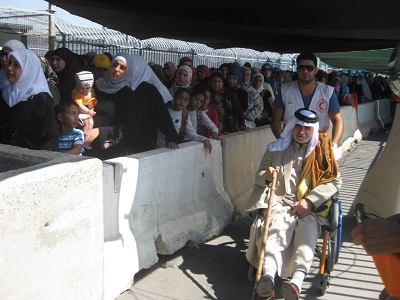
Security giant G4S was cleared of failing to respect the human rights of Palestinians in Israel and the occupied territories by a UK watchdog on Wednesday, but was found to be failing in specific legal obligations.
The government-funded National Contact Point (NCP) said it found no evidence of any “broad failure” by G4S to respect human rights.
However, the NCP said G4S was not meeting specific obligations relating to human rights within OECD guidelines for multinational enterprises.
The security firm claims it has been vindicated by NCP’s findings, but Lawyers for Palestinian Human Rights (LPHR) said the ruling proved G4S was violating human rights obligations involving Israeli treatment of Palestinians.
The government watchdog, which is part of the Department for Business, Innovation & Skills, is responsible for enforcing the Organization for Economic Co-operation and Development’s (OECD) standards for multinational conduct.
It investigated a complaint by LPHR that alleged G4S was complicit in human rights violations by supplying and maintaining equipment at facilities in Israel and the occupied Palestinian territories.
These services include maintaining baggage scanning equipment and metal detectors at military checkpoints, some of which are located along the West Bank Separation Wall, a barrier the International Court of Justice has ruled illegal.
LPHR also alleged G4S is complicit in human rights violations against Palestinian detainees and prisoners in Israeli Prison Service facilities both in Israel and the occupied territories.
This ill treatment includes solitary confinement and excessive use of administrative detention.
The NCP’s ruling was contradictory, as the watchdog cleared G4S of general failures to respect human rights, but found the company wasn’t meeting its obligations in specific areas.
It found G4S’s actions weren’t consistent with its obligation under Chapter IV, Paragraph 3 of the OECD Guidelines.
This clause states companies must “seek ways to prevent or mitigate adverse human rights impacts that are directly linked to their business operations, products or services by a business relationship, even if they do not contribute to those impacts.”
It also found G4S was failing to uphold its obligations under Chapter II, Paragraph 2, which calls on firms to “respect the internationally recognized human rights of those affected by their activities.”
Overall however, G4S was considered to be following OECD guidelines.
“The UK NCP does not find any broad failure by G4S to respect the human rights of people on whose behalf the complaint is made,” the report said.
While the NCP doesn’t recommend G4S end its business relationships in Israel, it does urge the firm to take steps to demonstrate it’s addressing the human rights impacts of its work.
This inconsistent ruling has led G4S to declare itself blameless, while complainant LPHR has announced itself victorious against the security firm.
G4S said in a statement: “[The report] does not find any general failure by the company to respect the human rights of the people on whose behalf the complaint is made or any failure to respect human rights in regard to its own operations. [It] refers to breaches of the guidelines which the [report] acknowledges are for technical reasons.”
LPHR director Tareq Shrourou said: “By reason of its business relationship with the Israeli state agencies who violate international law, G4S has been found in breach of its human rights obligations under the OECD Guidelines.
“The reality is that the track record indicates the only effective action G4S can take to prevent all involvement in Israel’s serious, systemic and sustained human rights mistreatment of Palestinians is for G4S to end those business relationships with immediate effect.”
(RT.com)





